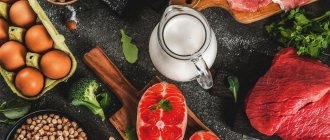Science experiment
A Canadian scientist who was engaged in Arctic research decided to prove from his own experience that eating exclusively meat is harmful. For this, Vilhjalmur Stefansson switched his diet to meat, and this continued for five years. As a result, he received eighty percent fat and twenty percent protein daily. Twenty years later, the writer and scientist repeated his experiment. But this time he was under medical supervision and only ate meat for one year.
Protein diet for weight loss - menu
When eating a protein diet, it is important not only to choose the right foods, but also to distribute them among portions. It is recommended to eat foods containing fiber and carbohydrates for breakfast and lunch. But dinner should consist only of protein foods. In order to correctly create a menu, you must accurately calculate the number of calories for each day. Calculations are carried out individually: the characteristics of the body are taken into account, in particular the person’s lifestyle and physical activity. The coefficient can be accurately determined by an experienced nutritionist.
So, with a protein diet you can eat the following foods:
- chicken breast, always without skin;
- lean pork, veal;
- fish (salmon or tuna are great); seafood;
- dairy products with a low fat percentage;
- various cereals;
- eggs;
- vegetables;
- nuts;
- legumes;
- hard cheeses.
During the diet, you should give up some foods so as not to harm your body and get the maximum benefit from this diet. It is worth limiting your consumption:
- too sweet fruits;
- vegetables that contain large amounts of starch;
- carbonated and alcoholic drinks;
- dairy products that contain a lot of fat;
- all kinds of sweets.
For example, for breakfast you can boil chicken, veal or pork, drink kefir or eat cottage cheese. For lunch, it is recommended to cook porridge, fish, and make a vegetable salad. But for dinner, it’s best to boil chicken or lean pork and be sure to make some kind of salad, maybe from fresh carrots or vegetables.
results
When Viljalmur ate only low-fat meat, he became worse. And this happened in both the first and second cases. As soon as the scientist added a little fat, his health improved dramatically. Finishing the experiments and switching to a normal diet, Stefansson again felt worse. This is why he came to the conclusion that a high-protein diet is harmful to health. But if you consume enough fat, it can benefit your body. The researcher lived to be 83 years old and died in good health.
“Olga” from the series of the same name: the tragic fate of actress Yana Troyanova
Smooth armpits without shaving: ways to remove hair using conventional products
Only on a soft spot: Russian Domostroy forbade punishing children in any other way
Proteins increase metabolic rate and accelerate fat burning
This feature of proteins is due to the fact that they have a high thermal effect.
. That is, their assimilation requires the use of large amounts of energy. Protein food ensures that the body receives the molecules it needs, but excess “provisions” are practically unable to be deposited as fat, since they simply burn out during the digestion process.
It has been found that eating a high-protein diet allows you to burn 260 more calories per day than a low-protein diet. The same amount of calories is burned during an hour of intense training.
Proteins at the peak of popularity
Recently, people have begun to suffer more from excess weight. For the sake of losing weight, some people prefer to eliminate fats and eat only low-fat foods. Other people consume large amounts of protein shakes to gain muscle mass. Their production and consumption have increased enormously in recent years. Manufacturers make big profits and try to introduce more people to this diet. Many people believe that it is the excess or lack of protein that will be beneficial for them.
How much protein do you need to eat to lose weight?
Scientists say that a diet high in protein (~34% of total calories from protein) is significantly more effective in reducing body fat, and is better for both health and weight loss 6,7.
Look at the results of the following experiment.
Experiment: Benefits of a 2.2 g/kg protein diet for health and weight loss compared to 1.1 g/kg
In this 12-week study, researchers compared the effects of low-protein (1.1 g/kg) and high-protein diets (2.2 g/kg).
The result: Participants in the high-protein diet group not only lost more weight, but their blood levels of “bad” low-density cholesterol also decreased , which was not observed in participants in the low-protein diet group 5.
If you think what we do is important, support our project!
YES!
For weight loss, it is recommended that ~30% of calories in the diet come from protein (or approximately 1.5-2 g of protein per kilogram of body weight)
A natural question may arise: isn’t this amount of protein harmful?
The issue of protein harm has been studied quite well. Overall, scientific research suggests that it is safe for kidney, liver, and bone health in healthy people, both short-term and long-term use.
Protein norm
Experts believe that buying foods high in protein is a waste of money. The body needs protein so that amino acids can be broken down normally. Such food enters the small intestine, and then the liver “sorts” what should be left and what should be excreted (the excess is excreted in the urine). For adults who are not very active in their lifestyle, people are recommended to consume 0.75 grams of protein per kilogram of weight per day. For men, the recommended amount is 55 grams, and for women - 45. This is equal to two servings of meat, fish, nuts, legumes, and tofu that can fit in the palm of your hand.
When toothpaste is harmful to children: permissible age doses
25 children of a childless man: an extraordinary reunion
The newlyweds traveled all over the world and took wedding photos in every country
Norm
In order for proteins to be quickly and efficiently absorbed, it is necessary to correctly calculate their consumption. For example, in one meal you should not eat more than 30 g of pure protein (a whole chicken breast weighing 155 g). These indicators are individual. They are calculated from the norm of 0.8 g of protein per 1 kg of weight. Nutritionists have compiled a table of the ratio of height, weight and the required amount of protein per day.
| Height | Floor | Weight/norm of protein per day | |||
| 40-60 kg | 60-80 kg | 80-100 kg | 100-130 kg | ||
| 145-155 cm | women | 55-65 g | 65-75 g | 75-85 g | 85-95 g |
| men | 85-95 g | 95-110 g | 110-120 g | 120-135 g | |
| 155-165 cm | women | 65-75 g | 75-85 g | 85-100 g | 95-115 g |
| men | 95-105 g | 105-120 g | 120-135 g | 135-145 g | |
| 165-175 cm | women | 80-85 g | 85-95 g | 95-110 g | 105-130 g |
| men | 110-115 g | 115-130 g | 130-145 g | 145-156 g | |
| 175-185 cm | women | 85-95 g | 95-105 g | 105-120 g | 125-145 g |
| men | 115-125 g | 125-140 g | 140-155 g | 155-175 g | |
With age, the rate of consumption of this substance decreases, so these tables are relevant for people from 20 to 50 years old.
A lack of protein, just like its excess, can trigger complex processes in the body. An excess amount of this substance does not threaten an ordinary person who is not associated with the world of sports. But protein deficiency is fraught with problems such as:
- violation of energy metabolism;
- malfunctions of internal organs (pancreas, liver);
- atrophy of muscle tissue.
Therefore, you need to strictly monitor the intake of this nutrient.
Proteins for bodybuilders
For the average person, a lack of protein can lead to hair loss, brittle bones and teeth. You may also experience skin rashes and weight loss as a result of decreased muscle mass. But those who suffer from eating disorders are more susceptible to these symptoms.
Among athletes who are actively involved in sports, there are many adherents of protein products. And this is not without reason, since as a result of power loads, proteins are broken down in the muscles. And to strengthen the latter, renewal of proteins is necessary. The main role in this process is played by the amino acid leucine. It is leucine that is so abundant in protein shakes that are recommended for bodybuilders (some experts claim that without this replenishment, which is recommended after training, muscles simply will not grow).
List of protein foods for weight loss
So, let's find out what these protein foods are.
SIMILAR MATERIALS
SIMILAR MATERIALS
It is already a proven fact that protein for weight loss is a necessary and one of the best food components that should be included in any diet. Let's first figure out why we need protein at all? What does it give to our body?
Protein (also called protein, from the Greek protos - first, most important) is the building material from which all the cells of our body are built. All our organs are protein! You and I are protein creatures, we consist entirely of protein: muscles, liver, heart, nerve cells, blood, lungs, brain, skin, nails, hair - this is all protein.
A person who eats his protein quota every day builds and recovers. A person who does not eat his protein quota is destroyed.
Benefit or harm
A 2012 study confirmed that protein does not actually increase fat mass, but promotes exercise performance and recovery after exercise. But only if it is consumed with fast carbohydrates. At the same time, scientists have proven (the experiment was conducted in 2014) that protein supplements do not help untrained people. At the very least, you shouldn’t expect results for several weeks. In the future, if you continue exercising, the effect will intensify.
Sometimes we wear a bra incorrectly: ways that are harmful to health
A broken nail is no problem: tips for treating nails at home
Seven daily habits of happy people
But you can be sure that the benefits of shakes and bars with increased amounts of protein are greatly exaggerated. It is enough for a person to consume the usual range of foods with the recommended amount of protein. And all additives are just a marketing ploy. Although in some cases (for athletes with special loads) there are exceptions.
Morning with protein
Summarizing the information from the sections, the authors note that even small amounts of protein can have a positive effect on both immediate and long-term adaptation.
essential . If the exercise is carried out in the morning, then taking even a small amount of protein and/or carbohydrates will have a positive effect on the results of the exercises performed.
Young people need 20 grams of complete protein for maximum benefit, while older people may need more. In general, 20–40 grams of protein per meal is needed for maximum anabolic effects.
Looking at pre- and post-workout meals, a person with a lean body mass of 70 kg needs 28-35 grams (0.4 - 0.5 g/kg body weight) of high-quality protein at each meal. There should be 3 to 6 hours between these meals, depending on the rate of absorption (type and consistency of nutrients consumed). Carbohydrate intake before, during and after exercise is associated more with endurance exercise.
Proteins for older people
They are simply necessary for people of mature age, since muscle mass decreases during this period. People become less active, and this leads to various diseases. But the fact is that in old age a person gives more preference to sweets than to protein foods. Therefore, scientists recommend producing certain types of treats with increased amounts of protein (for example, cookies).
Proteins are very filling
Protein foods perfectly satisfy hunger and prevent its occurrence. Even with a small amount of protein consumption, a person feels full. This is due to several features of protein foods:
- proteins suppress the production of the hunger hormone ghrelin
- promote the production of the satiety hormone – peptide YY
How important this protein feature is for the weight loss process can be understood from a recent study. During the research it was proven that
Increasing protein consumption from 15% to 30% of the daily diet allows women who are overweight to eat 441 fewer calories per day without any forced food restriction.
This is what concerns the real desire to eat, that is, a state when a person becomes weaker and needs support with nutrients. Separately, it should be said about the painful desire for snacks, both day and night.
This desire differs from true hunger in that it has nothing to do with the need to introduce nutrients into the body. In this case, we are talking only about the psychological desire to eat, which in essence is no different from the desire to smoke or drink alcohol.
So, it has been established that the inclusion of additional amounts of protein in the diet can very significantly reduce the craving for unmotivated meals.
For example, in one experiment, overweight men, after increasing their daily protein intake by 25%, showed a 60% reduction in snacking cravings during the day and a 50% reduction in snacking cravings at night.
It is believed that this effect of proteins is associated with their ability to normalize the functioning of dopamine, a brain neurotransmitter involved in the formation of various addictions.
Binge eating
Scientists are sure that overeating proteins is an unattainable state. It is unlikely that anyone will come up with a diet that will consist exclusively of proteins (without even the minimum amount of fats and carbohydrates). But if you do this, you can observe problems with the kidneys and bones. Therefore, if a person eats normally and has the right eating habits, nothing like this threatens him. At least such examples are extremely rare. The only warning is the same protein supplements, which, if consumed in excess, can actually lead to poor health.
Why is it important to eat proteins and carbohydrates together?
The simplest explanation is that carbohydrates should enter the body simultaneously with proteins - the absorption process goes faster and better when they are taken together. A balanced diet with a moderate amount of proteins and carbohydrates and a small amount of fat is much more beneficial for the formation of a textured body and for regular weight loss.
The mechanism of work and interaction of proteins and carbohydrates in the human body
Proteins, when entering the body, are broken down into amino acids, which are the main building material for the body's muscle tissue. But amino acids cannot get into the muscles themselves; insulin serves as their “carrier,” which can only be formed in the presence of carbohydrates. Therefore, by separating the intake of proteins and carbohydrates, we will not be able to provide the muscles with either the nutrition or energy necessary for the loads performed.
Carbohydrates entering the body are transformed into glucose, which saturates the blood with sugar. When there is an excess amount of sugar, which usually occurs when taking simple carbohydrates, insulin begins to convert glucose into fat, and also slow down the process of breaking down fats that enter the body with food. This is why it is important to eat complex carbohydrates.
Complex carbohydrates do not trigger the mechanism of action of insulin, so the body’s own fat reserves are subject to a massive attack, sugar and glucose are produced from internal resources.
For clarity, here is a diagram:
Benefits of combined nutrition
Glycogen, which is the main source of energy in the body, comes in the form of glucose, from which it is produced. In a healthy adult, the amount of glycogen is usually 300-400 g. During active exercise, most of the glycogen is lost, and if you do not replenish its reserves by eating carbohydrates along with proteins, then the effectiveness of training decreases significantly. Plus, the athlete experiences a loss of strength, nervousness and a constant feeling of hunger.
It is not for nothing that nutritionists recommend eating at regular intervals, because this stabilizes the uniform and constant production of insulin. Protein, supplied every 3-4 hours, slows down the breakdown of carbohydrates and normalizes the amount of sugar entering the blood.
An important effect of uniform and combined intake of proteins and carbohydrates will be the thermal effect, which helps in the construction of muscle tissue. And an excellent bonus is the acceleration of metabolic processes; the body will not be distracted by additional efforts, but will be able to work smoothly and constantly like clockwork.
Author: Irina G. (especially for Calorizator.ru) Copying this article in whole or in part is prohibited.
Weight loss
If you are planning to lose weight, be sure to consume protein foods. It will be especially useful for breakfast. If you give it preference, you will not feel hungry all day. Your diet should consist of 30% proteins and fats and 40% carbohydrates.
While a person who does not want to lose weight is recommended to consume 15% proteins, 30% fats and 55% carbohydrates per day. Just be careful with red meat, as its excess consumption can lead not only to obesity, but also to cancer. Eat a balanced diet and stay healthy.
Found a violation? Report content
Why you can't eat only proteins
Despite the obvious benefits for weight loss, protein foods can be harmful to the body. If you add only proteins to your diet and exclude carbohydrates and fats, then all metabolic processes will be disrupted. The amino acids into which protein is converted are broken down into ketone bodies. They usually self-destruct in the body, but this requires carbohydrates. In the long-term absence of the latter, a serious condition can develop - ketosis, which leads to poisoning of the entire body and affects general well-being in the form of weakness and malaise. The lack of fat disrupts lipid metabolism, as a result of which excess weight is formed, and fat begins to be deposited not only on the sides, but also envelops the internal organs. Over time, metabolism slows and the incidence of chronic diseases increases.
Protein diets should not last more than 3 days. A balanced diet is the basis of proper, healthy nutrition, the key to a slim figure and a beautiful body.
Calorie table for different foods
Types of proteins in the human diet
Proteins can be divided into two large groups: animal and plant origin. They belong to the same class of chemical compounds and generally perform the same functions, but they have a few differences.
Animal proteins
. Their advantage lies in the composition of amino acids - the chains from which the protein molecule is built. Animal products are complete proteins: they contain all the essential amino acids - compounds that the body is unable to produce on its own, but without them it cannot function normally. A conditional disadvantage of animal products is a large amount of fat, which can nullify all efforts to lose weight.
Plant proteins
. The composition of such proteins is poorer, since only soy and quinoa contain essential amino acids. All other plant products lack one or two amino acids from this group, which makes them less preferable in the human diet. But this is only at first glance: with a nutritious and varied diet, this lack of vegetable protein is easily eliminated. The combination of different proteins of plant origin can yield the entire complex of amino acids: both essential and essential. Which products to choose is a matter of personal taste and preference. But losing weight is a process that requires a sufficient amount of energy and strength, so it is important to take into account one more nuance. Plant proteins take longer to break down and require more resources from the body than animal proteins.
Protein table for weight loss
The table below shows foods that can be included in a healthy diet
: table of proteins for weight loss
| Product | Protein per 100g. |
| Chicken breast | 31 |
| Turkey fillet | 25 |
| Lean beef | 23 |
| Tuna | 29 |
| Mackerel | 24 |
| Salmon | 20 |
| Shrimps | 19 |
| Cod | 18 |
| Cottage cheese | 18 |
| Cheese | 25 |
| Eggs | 12 |
| Peanut | 26 |
| Almond | 21 |
| Cashew | 18 |
| Lentils | 24 |
| Chickpeas | 19 |
| Beans | 16 |
| Quinoa | 14 |
| Buckwheat | 13 |
| Spinach | 6 |
| Champignon | 5 |
| Green pea | 5 |
| Brussels sprouts | 4 |











